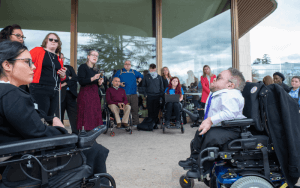A “significant amount of progress” still needs to be made on implementing the UN disability convention in Wales, according to a new report co-produced by disabled people.
Disability Wales has been working with disabled people across Wales on the “shadow report”, which shows how the UN Convention on the Rights of Persons with Disabilities has been implemented in Wales since 2017.
The report says that some progress has been made since 2017, including the Labour-run Welsh government’s commitment to enshrining the convention into Welsh law, and its publication of an action plan on disability rights.
It also highlights the Welsh government’s “rights-based approach to policymaking”, which it contrasts with the approach of the Conservative UK government in Westminster.
But the report says there is still a “clear sense of frustration” among disabled people at the “perceived stagnation” of Welsh government policy, with many of its policies failing to improve their “material circumstances”.
In 2020, Disability Wales research found that 76 per cent of disabled people in Wales who were surveyed did not believe their rights would improve over the next five years.
One respondent to a survey carried out for the new report said that poverty was “a fact for disabled people in Wales”.
Much of the relevant policy on poverty is the responsibility of the UK government in Westminster, but the report points out that some benefits are distributed by local authorities, such as social care direct payments and local housing allowance, and are therefore the responsibility of the Welsh government.
The report also points to the “challenges” thrown up by the COVID-19 pandemic, with government research showing that 68 per cent of Covid-related deaths in Wales were of disabled people.
A key concern during the early weeks of the pandemic was the imposition of Do Not Attempt Resuscitation (DNAR) notices on disabled people’s medical files, with one GP practice in south Wales writing to disabled patients to ask them to sign a DNAR form so as to save medical resources for “the young and fit who have a greater chance”.
Among other potential breaches of the convention in Wales, the report says that public transport has been “repeatedly raised as a major limitation on independent living, especially for those living in North Wales or in rural areas”.
There have also been incidents of disabled people being “unable to choose where they live and having to move away from loved ones and support networks”.
One respondent to the survey said: “I have experienced the threat of being placed against my will into residential accommodation 50 miles from any friends as there wasn’t anywhere available locally.
“When I expressed my dismay at this I was told that a court order could be made to force me to accept this accommodation.”
The report also highlights “significant barriers” faced by disabled people trying to access education, while access to appropriate housing is a “key concern” for many disabled people in Wales.
One improvement since 2017 has been the establishment last year of the Welsh government’s Access to Elected Office Fund Wales, which provides funding for impairment-related costs to disabled candidates for political office.
But the shadow report also points out that many blind and partially-sighted people still cannot vote in secret and that this process “must be improved” so they can vote independently.
The report concludes that there is a persistent gap between “the experiences of disabled people and the intentions of those in power” in Wales.
It adds: “Although we have seen some positive steps since 2017, the next challenge is to implement the rights of disabled people fully in Wales in the wake of the pandemic and the impending cost of living crisis.”
The shadow report, and three others covering England, Scotland and Northern Ireland, will be submitted to the UN’s committee on the rights of persons with disabilities (CRPD), along with a UK-wide report.
The UN committee will use the shadow reports – and other evidence – to help it draw up a list of questions to put to the UK government, and the three devolved governments in Wales, Scotland and Northern Ireland, which will have a year to respond in writing before being examined publicly by the committee.
Picture: The Palais Wilson in Geneva, home of the CRPD, by Romano1246, is licensed under the Creative Commons Attribution-Share Alike 3.0 Unported, 2.5 Generic, 2.0 Generic and 1.0 Generic license
A note from the editor:
Please consider making a voluntary financial contribution to support the work of DNS and allow it to continue producing independent, carefully-researched news stories that focus on the lives and rights of disabled people and their user-led organisations.
Please do not contribute if you cannot afford to do so, and please note that DNS is not a charity. It is run and owned by disabled journalist John Pring and has been from its launch in April 2009.
Thank you for anything you can do to support the work of DNS…

 Government’s response to UN committee ‘was insult to disabled people’
Government’s response to UN committee ‘was insult to disabled people’ UN committee asks government: ‘Why are you demonising disabled people?’
UN committee asks government: ‘Why are you demonising disabled people?’ MPs undermine key government claim, days after it defended its record at the UN
MPs undermine key government claim, days after it defended its record at the UN